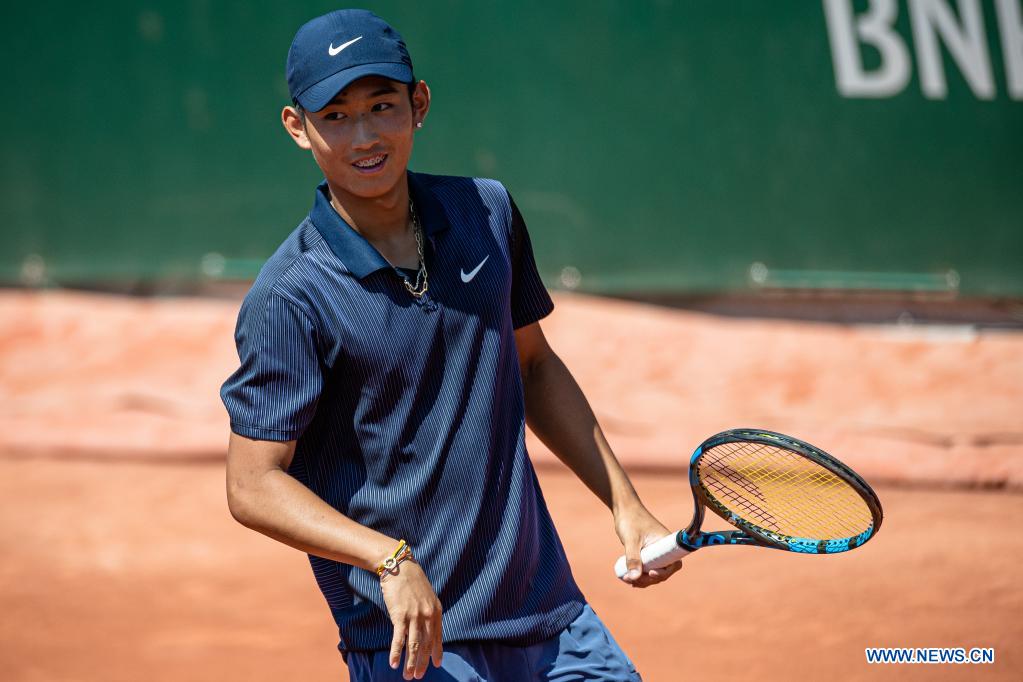Chinese tennis prodigy sets his sights on the big time
 0 Comment(s)
0 Comment(s) Print
Print E-mail China Daily, March 15, 2022
E-mail China Daily, March 15, 2022

History-making tennis prodigy Shang Juncheng has vowed to live and breathe like a pro to catch up with the world's best as hopes grow China has finally unearthed a star for the men's tour.
The Beijing-born 17-year-old became the first male Chinese mainland player to qualify for an ATP Masters 1000 event last week, but is under no illusions that matching his junior success on the adult circuit will be easy.
"The biggest challenge turning from junior to pro is the physical gap between teens and adults. The power and conditioning needed are on another level," Shang said during an online interview with Chinese media after advancing to the main draw of the Masters tournament at Indian Wells, California, following two qualifying wins.
"In that sense, I need to improve my strength, work harder, rest better and spend less time on distractions, such as using my smartphone... I need to be a more disciplined player than I am now," said Shang, who is the youngest player to qualify for the main draw of an ATP Masters tournament since Rafael Nadal did so at 16 in Hamburg in 2003.
Simply being mentioned in the same breath as Nadal, the all-time men's Grand Slam record holder with 21 wins, heaps even more expectations on Shang-but the youngster is determined to keep his feet firmly on the ground.
"As far as my goal going forward on the pro level, I just want to gain as much experience as possible, to improve my game in all aspects and not think too much on the rankings," said Shang, who currently ranks 543rd in the world.
A straight-sets loss to Spain's former world No 52 Jaume Munar on Saturday at Indian Wells underlined the size of the task that now awaits Shang as he bids to climb the rankings.
"He played at a better pace, taking his time, serving really well and dictating play," Shang said after losing 6-3, 6-4 despite twice breaking the 24-year-old Spaniard.
"I felt like I'd prepared well for the match. It turns out not enough, especially in regard to my endurance and conditioning. It just takes time to learn and improve."
Munar advised Shang to simply keep doing what he's doing.
"Don't think about what other people are thinking, just do your own path and work as hard as you can," he said.
"He is very young and very talented. The most important thing is the work ethic and being humble to understand that you are good in juniors but you have to be a lot better if you want to be on top among the pros."
Shang will play his third tour-level main-draw event at another ATP Masters tournament in Miami next week via a wild-card entry, after making his pro debut at the 500 event in Rio de Janeiro last month.
Athletic pedigree
Shang's steady rise over the past year has shone a spotlight on Chinese men's tennis, which for decades has been in the shadow of the country's female players.
Highlighted by retired star Li Na's two Grand Slam victories (2011 French Open and 2014 Australian Open), China has enjoyed considerable success on the women's side, yet no male Chinese mainland player has ever cracked the world's top 100-Zhang Zhizhen's 139th place in November 2019 is the highest.
Shang's parents know what it takes to succeed in pro sports-his mother, Wu Na, is a former table tennis mixed doubles world champion, while his father, Shang Yi, played professional soccer for Chinese Super League giant Beijing Guo'an. They first took Shang Juncheng to a tennis court when he was 6, with his innate athletic talent quickly apparent.
The youngster's technical progress was speeded up by systematic training programs-first at an academy in Nanjing, Jiangsu province, run by Spanish doubles great Emilio Sanchez, and later at the renowned IMG Academy in Florida.
Supported by his father overseas since moving to the United States at 12, Shang's routine already imitates that of a pro-practice three hours a day, eat healthily and sleep at least 11 hours every night-at an age when video games and social media can often interrupt his peers' daily schedule.
"I feel I still need to better manage my time, spend less time on my phone and read more books whenever I am not training or playing," Shang said.
His efforts paid off big time last year as he reached the boys' quarterfinals at the French Open, then the semis at Wimbledon, before finishing runner-up at the US Open (won by Spain's Daniel Rincon) to finish his final year on the ITF circuit as junior world No 1.
"He was always a super nice kid. He always had his way of doing things, it seemed he always had one more gear," Sanchez, who coached Shang during his early years living in the US, told ATPTour.com.
Blessed with a soft touch and already moving well around the court-thanks to his training on clay at the Nanjing academy as a kid-Shang's game requires more aggression and a stronger serve, according to Sanchez.
"It doesn't matter how good the player is on the other side, he will not bend, he will always stay straight. He has a super strong core," said the Spaniard. "He does things smoothly and he will absorb any type of power from the opponents in a very, very nice way."






Go to Forum >>0 Comment(s)